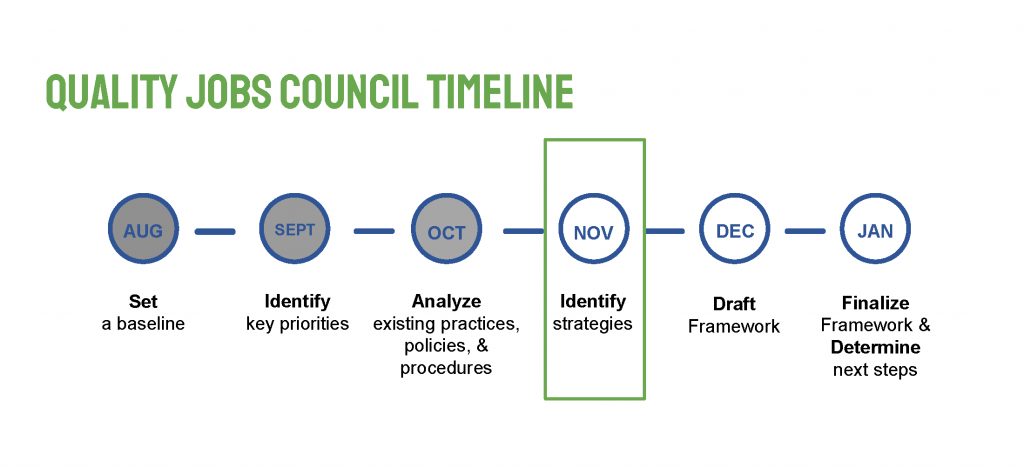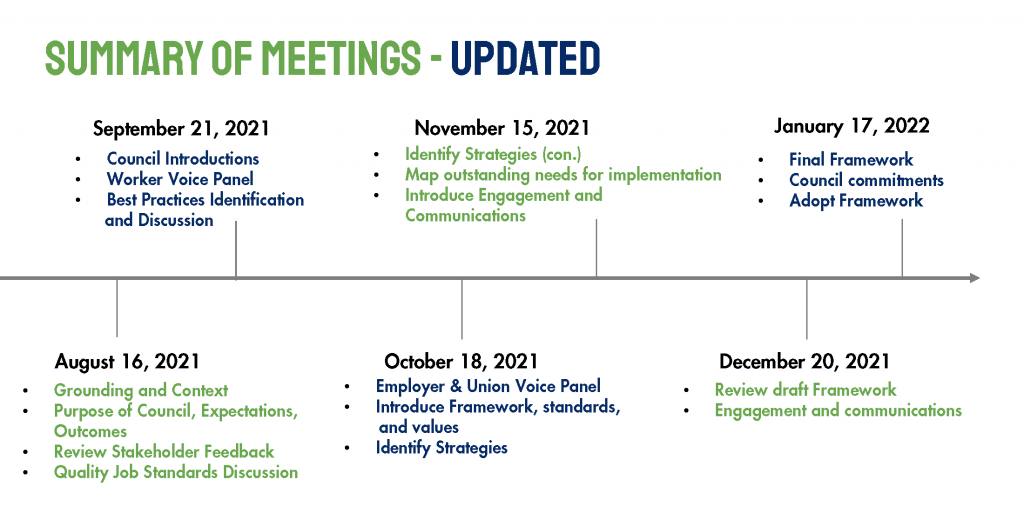What makes a position a quality job? Workforce Southwest Washington (WSW) and its partners in the Columbia-Willamette Workforce Collaborative (CWWC) are seeking answers to that question.
Together, the three workforce boards that comprise the CWWC oversee a bi-state labor market for the six-county region and have jointly launched a quality jobs initiative.

Darcy Hoffman – WSW’s Director of Business Services
Our Director of Business Services Darcy Hoffman is spear-heading the initiative for WSW. We sat down with her in the following interview to learn more about the Quality Jobs Initiative and its importance to our region.
What is the Quality Jobs Initiative?
The quality jobs initiative is a response to the COVID-19 pandemic and the ensuing historic unemployment levels and economic crisis. It is a strategy to stabilize our workforce and ensure our region can recover equitably.
The initiative is a commitment to designing and developing a regional approach with workers, businesses, job seekers, community-based organizations, economic developers and local municipalities to define, support and promote quality jobs in the Southwest Washington-Portland metro area.
The CWWC is designing and leading this regional approach to job quality. Our goal is that the quality jobs initiative will promote an equitable economic recovery and help us rethink our workforce programs and the ways that we invest public workforce funds into industry. We want to ensure that job seekers and workers across our region have access to high-quality jobs.
What constitutes a quality job?
There are numerous ways to define a quality job. We’re using the work of the Aspen Institute as a model. They’ve done a vast amount of research on job-quality markers. Right now, we are looking at:
- Living wages – that allow people to cover their basic living expenses, take care of themselves and their families and be able to build wealth and assets – that’s number one.
- Work environment – the work environment should be safe, free from discrimination, and have a process to engage workers and their voices and opinions.
- Schedules – stable and predictable work schedules will be important.
- Benefits – and a benefits packages that allows employees and their families to lead a healthy lifestyle and receive paid time off when they are sick or need a vacation.
- Career growth opportunities – internal opportunities that employees have to build their skills and advance in a career pathway to higher wages.
Who will the Quality Jobs Initiative support?
The pandemic caused unemployment to reach an all-time high. Many members of our community, including Black, Indigenous, Asian, Latine and other people of color, women, immigrants, individuals with disabilities, and people with less education, were disproportionally affected by the pandemic and the economic devastation that it caused. The strategy of the initiative is aimed at impacting those groups in a positive way.
On the other side, it’s to support businesses that are struggling to attract and retain employees to fill their job openings. That’s happening in all industries, in companies of various shapes and sizes. Our business partners can implement strategies from the quality jobs initiative that will help them improve job quality in their own workplace as a recruitment and retention tool.
Who are the key partners in the Quality Jobs Initiative?
Ultimately, we want it to be a whole-community initiative, but right now, in its infancy, the CWWC is leading the initiative and our quality jobs council is doing the work to define and shape it. The 22-person council is comprised of companies from our high-growth, high-demand sectors – construction, healthcare, manufacturing and technology. And regional community-based organizations who are responsible for serving the people that we want to positively impact. We also have labor representation, job seekers and employees on the council.
Its task is to define the criteria for our region and develop the framework to implement job quality strategies and interventions whether you are an employer, a workforce board, local government, service provider, labor/civil rights nonprofit, labor or worker.
Prior to that, the three workforce boards held community outreach and listening sessions to invite people to hear about what we were planning and give us advice on things that are important to them, the people they serve or the people they employ, so we can make sure those things are part of the end strategy.
How will the Quality Jobs Initiative help job seekers?
Once the framework is developed, we will be helping businesses to implement various strategies. Our goal is a flexible program that can be applied to any company, in any industry, at any level, that wants to improve their own job quality. We’ll be working to help those industry partners make improvements. Then we are going to be talking about those things quite publicly and sharing stories about the companies we are working with and why they’re such a great place to work. I think that will help the people using the workforce system see what opportunities may be more interesting than others because of the job quality markers that these companies will be meeting.
How will companies benefit from the Quality Jobs Initiative?
The benefit to companies will be helping them improve, not just their recruitment efforts, but also their job retention. Many of the companies we work with support an equitable economic recovery. Our framework for quality jobs will be full of ways they can demonstrate what is important to them. Our goal is impacting recruitment and retention and making jobs better for people – which is good for business.
What is happening right now with Quality Jobs?
The council has formed — we have held the first four of six meetings. They meet monthly through January. Their job right now is to digest the initial list criteria around wages, benefits and work environment and then further hone in on what specifics might look like in our region. Also, they’re gathering best practices and other resources for the final report that will be developed once the council dissolves in January. That final report will be a blueprint for the workforce boards and our industry partners to plug into and improve our own job quality.


Is there anything else you’d like to add?
One of the big disconnects in our public workforce system is that, on one side of the house, you have people that work directly with businesses to understand their needs in terms of their workforce and work on strategies to help them recruit and hire individuals.
On the other side, you have a team of career coaches working with job seekers and getting them into education and training and preparing them for jobs. The public workforce system is making significant investments in preparing those job seekers.
The two sides seem to be disconnected at times. The job seekers that we prepare do end up in employment, but they don’t always end up employed by the companies that we’re serving who we consider to be high-growth, high-demand, and have better wages and better opportunities for people. Through this initiative we want to close that gap and ensure that the people we invest in are getting opportunities with the companies that we are serving. A key piece of this strategy is to shore that up.
The quality jobs initiative is a growing and evolving project based on the dynamic work of the CWWC and quality jobs council. Learn more about the quality jobs initiative and our work at WSW here.
Businesses interested in getting involved in the quality jobs initiative should contact Darcy Hoffman at dhoffman@workforcesw.org or 360.608.4949.



